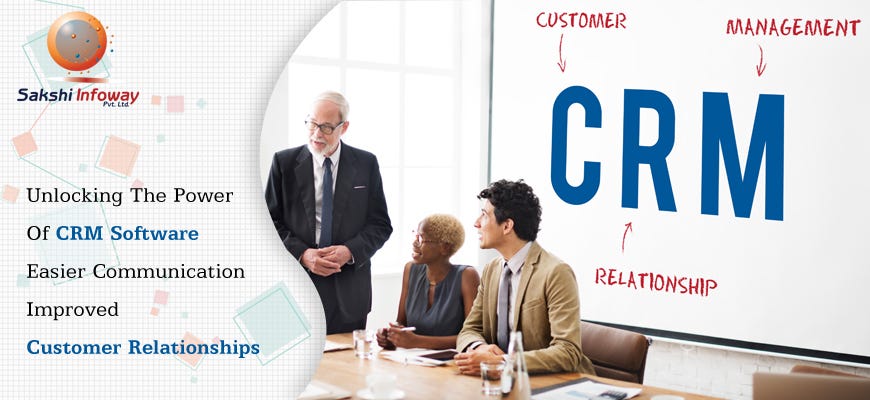CRM software, or Customer Relationship Management software, is a tool businesses use to manage and organize customer interactions. It allows companies to track customer information, analyze data, and streamline sales and marketing processes.
In today’s competitive market, CRM software is essential for businesses to enhance customer satisfaction, improve customer retention, and drive sales growth. With CRM software, companies can effectively manage customer relationships by accessing customer profiles, tracking communication history, and analyzing customer behavior.
By utilizing CRM software, businesses can optimize their operations and deliver a personalized, seamless customer experience, increasing customer loyalty and profitability. So, incorporating CRM software into a company’s workflow is vital for maintaining a competitive edge in today’s customer-centric business landscape.
Evolution Of CRM Software
The evolution of CRM software has been substantial, with early development and adoption paving the way for key milestones and advancements. In the early stages, CRM software underwent significant transformations as businesses recognized the need to manage customer relationships more effectively. As technology progressed, so did CRM software, with revolutionary changes occurring in the industry.
One notable milestone in the evolution of CRM software was the shift from on-premises solutions to cloud-based solutions. This shift allowed for greater accessibility and scalability, providing businesses with the flexibility to adapt and grow. Additionally, integrating artificial intelligence and machine learning into CRM software has opened up new possibilities for automating processes, analyzing data, and gaining valuable insights into customer behavior.
Moreover, the rise of mobile CRM applications has further extended the capabilities of CRM software, enabling businesses to access customer information on the go and enhance their sales and customer service activities. With each advancement, CRM software continues to evolve and empower businesses to build stronger relationships with their customers and achieve sustainable growth.
Key Features Of Crm Software
Key Features of CRM Software CRM software, or Customer Relationship Management software, is a powerful tool that enables businesses to effectively manage their customer data, streamline sales processes, automate marketing campaigns, provide exceptional customer service, and generate insightful analytics and reports. Customer data management: CRM software allows businesses to store, organize, and access valuable customer information such as contact details, purchase history, preferences, and interaction history. This enables companies to personalize customer interactions, better understand their needs, and build stronger relationships. Sales and pipeline management: With CRM software, businesses can track and manage their sales pipeline from lead generation to deal closure. It provides a centralized platform to track the progress of each deal, assign tasks to team members, set reminders, and forecast sales revenue. Marketing automation: CRM software can automate various marketing activities such as email campaigns, social media publishing, lead nurturing, and lead scoring. It helps businesses to efficiently target the right audience, nurture leads, and track the effectiveness of marketing efforts. Customer service and support: CRM software enables businesses to provide exceptional customer service by centralizing customer inquiries, complaints, and support tickets. It helps teams to manage and resolve customer issues efficiently, track response times, and maintain customer satisfaction. Analytics and reporting: CRM software provides powerful reporting and analytics capabilities to track sales performance, marketing ROI, customer satisfaction, and other key metrics. It generates detailed reports and visualizations to help businesses make data-driven decisions and identify areas for improvement. Overall, CRM software empowers businesses to streamline their operations, enhance customer relationships, and drive growth. CRM software is a crucial tool for businesses in today’s competitive market with its key features of customer data management, sales and pipeline management, marketing automation, customer service and support, and analytics and reporting.
Benefits Of CRM Software
A CRM software, short for Customer Relationship Management software, is a powerful tool that brings numerous benefits to businesses. It helps improve customer relationships, boost sales performance, streamline marketing efforts, optimize customer service processes, and enable data-driven decision-making.
Improved customer relationships
CRM software allows businesses to manage and nurture their customer relationships effectively. With a centralized database, businesses can easily track customer interactions, preferences, and purchase history, enabling personalized communication and tailored marketing campaigns.
Enhanced sales performance
Businesses can automate sales processes, track leads, and analyze sales pipelines through CRM software. This leads to better sales forecasting, improved lead conversion rates, and increased overall sales performance.
Streamlined marketing efforts
Businesses can efficiently manage marketing campaigns by leveraging CRM software, segment customer data, and measure campaign effectiveness. This helps target the right audience, enhance ROI, and optimize marketing strategies.
Efficient customer service processes
CRM software lets businesses centralize customer inquiries, track support tickets, and monitor service performance. This enhances response times, improves issue resolution, and leads to more satisfied customers.
Data-driven decision making
With CRM software, businesses can gather valuable customer data, generate insightful reports, and analyze trends. This empowers businesses to make informed decisions, identify growth opportunities, and drive overall business success.
Assessing Your Business Needs
Assessing your business needs is crucial when considering CRM software. By identifying pain points and challenges, you can determine the specific requirements that the software should address. This involves defining business goals and objectives, which will help align the CRM solution with your overall strategy. Evaluating departmental requirements is equally important, as different teams may have unique needs and workflows. Conducting a thorough analysis of each department’s functions and processes will enable you to select a CRM software that caters to their specific requirements. By considering these factors, you can ensure that the CRM software you choose is tailored to your business needs and capable of addressing your challenges. It’s essential to carefully assess your needs before implementing a CRM solution to maximize its benefits and improve efficiency.
Types Of CRM Software
Types of CRM Software:
There are several types of CRM software available in the market to cater to different business needs.
| Type | Description |
|---|---|
| On-premise CRM | This type of CRM software is installed and hosted on the company’s own servers. It allows businesses to have complete control over their data and customization options. However, it requires hardware and software maintenance and may involve higher upfront costs. |
| Cloud-based CRM | As the name suggests, cloud-based CRM software is hosted on the cloud. It offers the flexibility of accessing CRM data from anywhere with an internet connection. It eliminates the need for hardware maintenance and provides automatic updates. It is suitable for businesses that prefer scalability and ease of use. |
| Mobile CRM | Mobile CRM allows access to CRM data through mobile devices such as smartphones and tablets. It enables sales representatives and field workers to stay connected and access customer information on the go. It especially benefits businesses with a remote workforce or those requiring real-time data. |
Each type of CRM software has its advantages and considerations. Businesses need to evaluate their requirements and choose the type that aligns best with their goals and objectives.
Factors To Consider In CRM Software Selection
CRM software is crucial in optimizing business processes and improving customer relationships. When selecting the right CRM software for your business, it’s essential to consider a few key factors.
| Scalability and Customization Options | Ensure that the CRM software can scale with your growing business needs and offers the flexibility to customize it according to your specific requirements. |
| Integration Capabilities | Check if the CRM software integrates seamlessly with your organization’s essential tools and systems, such as email marketing software, e-commerce platforms, or project management tools. |
| User Interface and Ease of Use | A user-friendly CRM software with an intuitive interface will encourage wider adoption among your team, enabling them to utilize the software and improve productivity effectively. |
| Security and Data Privacy | Ensure the CRM software offers robust security measures to protect sensitive customer data and complies with relevant privacy regulations, such as GDPR. |
| Pricing and Support | Consider the pricing plans offered by the CRM software vendor and evaluate the level of customer support provided, including training resources and technical assistance. |
Creating A CRM Implementation Plan
Creating a CRM Implementation Plan To successfully implement a CRM system, it is essential to have a well-defined plan in place. This involves defining the project scope and objectives, which helps determine the goals and expectations of the CRM implementation. By clearly outlining what needs to be accomplished, teams can align their efforts towards the intended outcomes. Another crucial step is establishing a cross-functional implementation team. By involving representatives from various departments, such as sales, marketing, and customer service, a diverse range of perspectives can be considered which aids in the overall success of the implementation process. Additionally, developing a realistic timeline is vital. This involves breaking down the implementation process into manageable phases and setting realistic deadlines for each stage. By doing so, the team can stay on track and ensure a smooth and effective CRM implementation. |

Credit: www.captevrix.com
Steps To Successful CRM Implementation
Implementing CRM software involves several key steps to ensure success. One crucial element is data cleansing and migration. It is essential to clean and organize existing data before migrating it to the new CRM system. This step helps eliminate duplicate or inaccurate information, ensuring the system starts with reliable data. The next step is customization and configuration. Tailoring the CRM software to meet your specific business needs is vital. This involves configuring fields, workflows, and automation to align with your processes and requirements. Staff training and user adoption come next. It is essential to provide comprehensive training to employees to maximize the benefits of the CRM system. User adoption is crucial for successfully implementing CRM, so ensuring staff feel comfortable and confident using the software is essential. | After training, comes testing and quality assurance. This step involves thoroughly testing the CRM software to validate its functionality and identify potential issues or bugs. Quality assurance ensures that the system performs as expected and meets the business requirements. Finally, the go-live and ongoing support phase marks the transition to using the CRM software in a live environment. Ongoing support and maintenance are necessary to address any user queries or technical difficulties that may arise. |
Ensuring CRM Adoption And Success
CRM software, short for Customer Relationship Management software, is a powerful tool businesses use to manage and analyze their interactions with customers and prospects. Ensuring successful CRM adoption requires leadership buy-in and support, building a culture of CRM adoption, continuous training and reinforcement, and monitoring and measuring success metrics.
Leadership buy-in and support play a crucial role in driving CRM adoption. When leaders prioritize and promote using CRM software, it sends a clear message to the entire organization, encouraging their commitment to utilizing the system effectively.
Building a culture of CRM adoption entails fostering an environment where using CRM software becomes second nature for employees. By integrating CRM practices into daily workflows and recognizing and rewarding CRM adoption, organizations can cultivate a CRM-friendly culture.
Continuous training and reinforcement are essential for CRM success. Offering ongoing training sessions, tutorials, and resources ensures that users have the necessary knowledge and skills to utilize CRM software effectively. Regular reinforcement of best practices and providing feedback further enhances user adoption.
Monitoring and measuring success metrics allow organizations to gauge and optimize their CRM implementation. By establishing key performance indicators (KPIs) such as customer satisfaction, sales growth, and customer retention, businesses can assess the effectiveness of their CRM strategies and make data-driven improvements.
Frequently Asked Questions For CRM Software What Does It Mean?
What Is CRM Software And How Does It Work?
CRM software stands for Customer Relationship Management software. It helps businesses manage interactions and relationships with their customers. It centralizes customer data, tracks interactions, manages sales pipelines, and facilitates customer communication. It helps businesses streamline their sales and marketing efforts, improve customer service, and strengthen customer relationships.
What Are The Benefits Of Using CRM Software?
CRM software offers several benefits for businesses. It helps businesses improve customer relationships by providing a centralized customer data and communication platform. It enables businesses to track sales opportunities, manage marketing campaigns, and automate repetitive tasks. It helps businesses enhance customer service and increase customer satisfaction.
Overall, CRM software helps businesses optimize their sales and marketing efforts and scale their operations.
How Does CRM Software Help In Increasing Sales?
CRM software helps businesses increase sales in multiple ways. It enables businesses to track and manage sales opportunities effectively, providing insights into the sales pipeline and helping sales teams prioritize leads. It helps businesses automate sales and marketing processes, saving time and effort.
It also facilitates personalized and targeted communication with prospects and customers, improving conversion rates. By streamlining sales operations, CRM software helps businesses close deals faster and boost revenue.
Conclusion
To sum up, CRM software is crucial in managing customer relationships effectively. Its benefits range from streamlining communication and sales processes to improving customer satisfaction and retention. With its advanced features and user-friendly interface, CRM software allows businesses to stay organized, enhance productivity, and achieve their goals.
Investing in a reliable CRM solution is indeed a game-changer that enables businesses to thrive in a highly competitive market.




